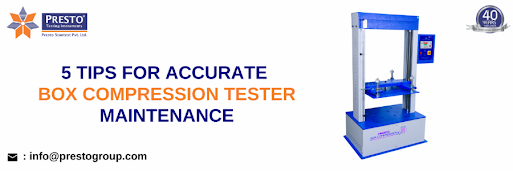How Does Presto Vibration Table Help With Vibration Isolation?
Vibration Table plays a crucial role in the vibration test for packaging to ensure the durability, integrity, and performance of various products and materials. In this industry, products often undergo extensive transportation, handling, and distribution processes, which expose them to various levels of vibration.
By subjecting products to controlled vibrations, manufacturers can simulate real-world conditions and evaluate their ability to withstand such mechanical stresses. Thus, we at Presto have designed a high-quality lab testing instrument known as a vibration table that is used to test the damage caused by repetitive movement of the objects replicated by vibrations.
This high-quality lab testing equipment has been designed in accordance with industrial standards including ASTM D-999, TAPPI T-817-pm, and IS7028 (partII). With the use of this high-quality lab testing instrument, packaging manufacturers can easily test the quality of the materials against vibrations and protect the contents present in them.
In this blog, we will discuss brief information about the Presto vibration table and the benefits of using this quality lab testing instrument in the packaging industry. So, let us get started!
All about Presto vibration testing instrument
The Presto vibration chamber is advanced testing equipment designed for conducting vibration tests in various industries. It offers several key features that make it highly efficient and reliable in delivering accurate test results.
This vibration table design is equipped with a digital LED display, providing clear and easy-to-read information about the testing parameters and results. It offers a wide range of frequency settings, allowing users to simulate different vibration conditions based on their specific requirements.
The table incorporates a digital timer that enables users to set the desired test run time, ensuring precise control over the duration of the vibration testing. This feature is particularly useful in evaluating the durability and performance of products under prolonged exposure to vibrations.
To prevent sample slippage during testing, the Presto vibration table design with rails on all sides. These rails provide a secure boundary, keeping the samples in place and minimizing any unwanted movements or displacements. Users can evaluate the product damage caused by repetitive movement with vibrations.
Presto is a leading vibration table manufacturer and offers this quality testing instrument designed with highly advanced features. Now, let us discuss a brief vibration table features and technical specifications that make it unique from other brands.
Features of Presto vibration table
The Presto vibration simulation table comes with a strong base plate with a rugged structure ensuring stability and durability during the testing process. It can withstand high-intensity vibrations without compromising the accuracy or reliability of the test results.
Below we have listed the features of the vibration table:
- Digital LED Display
- Highly accurate test results under various frequency settings
- Digital Timer for setting test run time
- Sample Slippage protection by rail on all sides
- Strong base plate with a rugged structure
- Adjustable Frequency
- Feather Touch Controls
Applications:
- Cement & Aggregate
- Food
- Chemical
- Customized sizes also provided on specific requests
With these high-end features and technical specifications, one can easily test the product against simulated vibrations.
Technical specifications of Presto vibration table
- Maximum Load Capacity: 100 Kg
- Display: LED (Digital)
- Table Size: 800 * 800 mm
- Amplitude: 25 mm peak to peak
- Power: 220V, Single Phase, 50 Hz
- Frequency: 2Hz to 6Hz
Testing model:
– Vertical synchronous
– Vertical asynchronous
– Swivel synchronous
– Swivel asynchronous
- Angle in Swivel Model: 0º, 30º, 60º, 90º
- Timer: Up to 99.9 min or 99.9 hrs
- In Swivel Testing Model, the angle is changed according to the changeable sprockets provided in the machine.
With these high-end features and technical specifications, one can accurately test the products against vibrations. This lab-testing instrument will play an effective role in the packaging industry.
Now, let’s see how vibration testing equipment is beneficial in the paper & packaging industry.
Advantages of using Presto vibration testing instrument
Presto vibration tables are designed to offer exceptional vibration isolation, making them a popular choice for paper & packaging manufacturers.
The benefits of using a Presto vibration table are numerous, including:
- Consistent performance: One of the greatest advantages of using a Presto vibration table is its ability to deliver reliable and consistent results over time. This means that you can use it to test products or conduct experiments with confidence.
- Feather touch controls: The Presto vibration table incorporates feather touch controls, offering a user-friendly interface for convenient operation and precise adjustments. The controls are intuitive and responsive, allowing users to make changes effortlessly and ensuring a smooth testing experience.
- Improved accuracy: When conducting precision measurements or tests, even small amounts of external vibrations can affect the accuracy of your results. By isolating the sample from external mechanical disturbances via its robust structure and dampening system, Presto’s vibration tables provide increased testing accuracy.
With these advantages, one can effectively make use of Presto vibration table in the packaging industry. You can give us a call at +91 9210903903 or email us at info@prestogroup.com to know vibration table price. Our team of technical experts will easily assist you with all your queries.
Source of content: How Does Presto Vibration Table Help With Vibration Isolation?




Comments
Post a Comment